

Tufts Fletcher School. The Fletcher School offers a large number of courses that are of interest to people who seek to pursue a career in social change in complex environments.
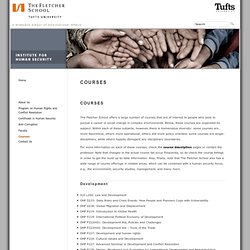
Below, these courses are organized by subject. Within each of these subjects, however, there is tremendous diversity: some courses are more theoretical, others more operational, others still more policy oriented; some courses are single-disciplinary, while others happily disregard any disciplinary boundaries. For more information on each of these courses, check the course description pages or contact the professor.
Note that changes in the actual course list occur frequently, so do check the course listings in order to get the most up-to-date information. Also, finally, note that The Fletcher School also has a wide range of course offerings in related areas, which can be combined with a human security focus, e.g., the environment, security studies, management, and many more. Development Conflict Resolution Humanitarianism Human Rights. UAB Global Health. The UAB Sparkman Center for Global Health is pleased to offer a continuing education certificate program in Global Health Studies (GHS).
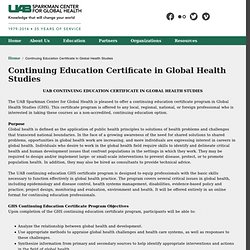
This certificate program is offered to any local, regional, national, or foreign professional who is interested in taking these courses as a non-accredited, continuing education option. Purpose Global health is defined as the application of public health principles to solutions of health problems and challenges that transcend national boundaries. In the face of a growing awareness of the need for shared solutions to shared problems, opportunities in global health work are increasing, and more individuals are expressing interest in careers in global health.
Individuals who desire to work in the global health field require skills to identify and delineate critical health and human development issues that confront populations in the settings in which they work. George Washington Univ Public Health. The GW academic experience is firmly rooted in each of our ten undergraduate and graduate colleges and schools.
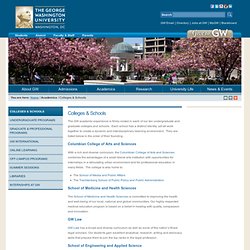
Each school has a distinct identity, yet all work together to create a dynamic and interdisciplinary learning environment. They are listed below in the order of their founding. Columbian College of Arts and Sciences With a rich and diverse curriculum, the Columbian College of Arts and Sciences combines the advantages of a small liberal arts institution with opportunities for internships in a stimulating urban environment and for professional education in many fields. The college is also home to: School of Medicine and Health Sciences The School of Medicine and Health Sciences is committed to improving the health and well-being of our local, national and global communities. GW Law GW Law has a broad and diverse curriculum as well as some of the nation’s finest legal scholars. SUNY/CID. The State University of New York's Center for International Development or SUNY/CID is a leading university based international development center enhancing the knowledge and practice of governance and policy making.
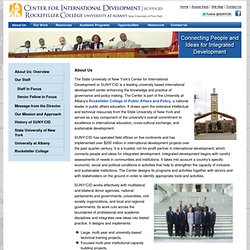
The Center is part of the University at Albany's Rockefeller College of Public Affairs and Policy, a national leader in public affairs education. It draws upon the extensive intellectual and technical resources from the State University of New York and serves as a key component of the university's overall commitment to excellence in international education, cross-cultural exchange, and sustainable development.
SUNY/CID has operated field offices on five continents and has implemented over $200 million in international development projects over the past quarter century. It is a trusted, not-for-profit partner in international development, which connects people and ideas for integrated development. Program Evaluation Johns Hopkins. MEASURE Evaluation at UNC. Population and Health Policies and Programs — UNC Carolina Population Center. The design, collection, and analysis of data to monitor and evaluate population and related programs and interventions in a global setting with the goal of informing policy The lack of strong evidence on the progress and effectiveness of population and related health programs is related to several issues, including difficulties in measuring some of the variables of most interest to programs, biases caused by non-random placement of programs, selectivity of participation, heterogeneity in responses, and indirect and spillover effects.
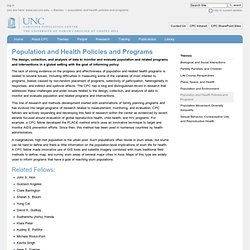
The CPC has a long and distinguished record in research that addresses these challenges and wider issues related to the design, collection, and analysis of data to monitor and evaluate population and related programs and interventions.